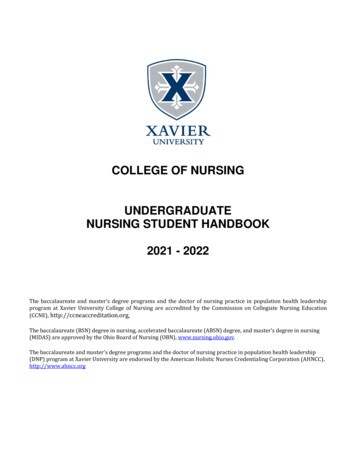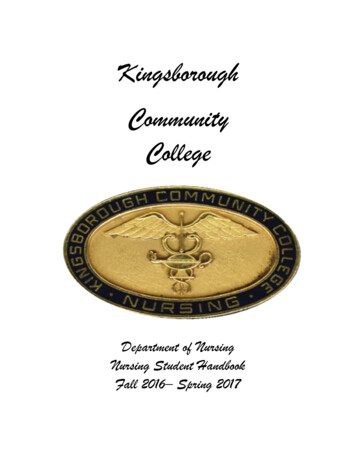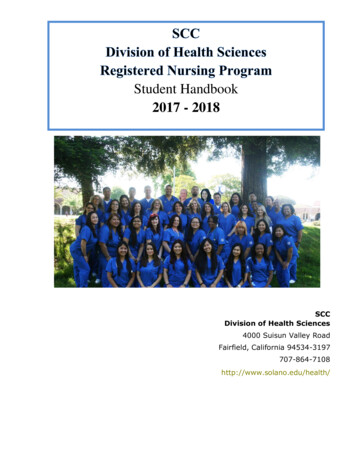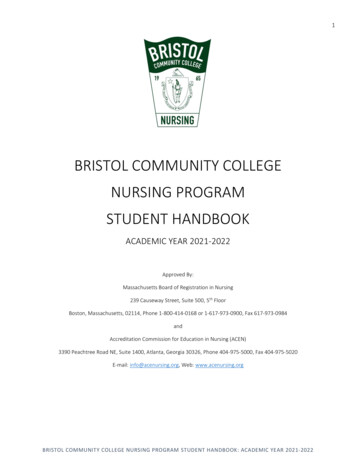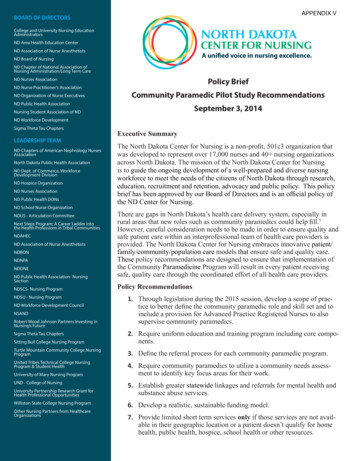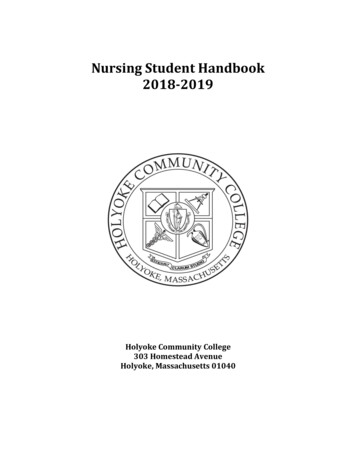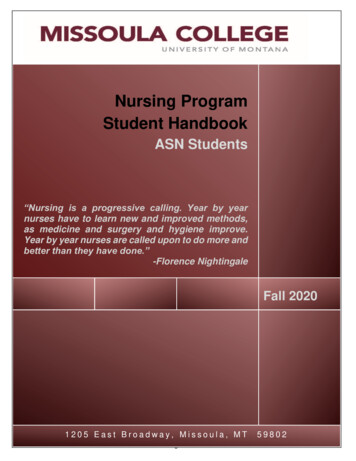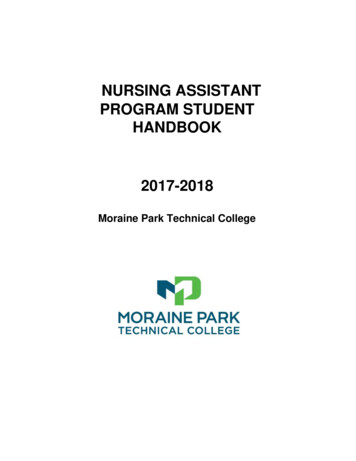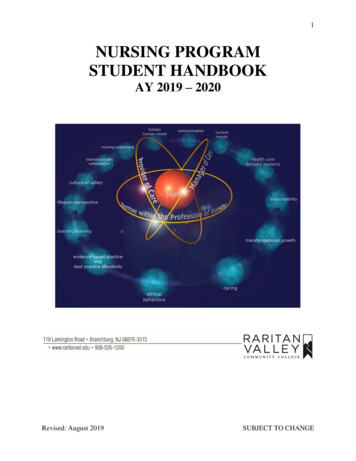
Transcription
1NURSING PROGRAMSTUDENT HANDBOOKAY 2019 – 2020Revised: August 2019SUBJECT TO CHANGE
2August 1, 2019Welcome to the Nursing Program of Raritan Valley Community College and the HealthScience Education Department. The faculty, staff, and alumni are happy to have you join uson the journey to your future career. We are committed to preparing nursing leaders fortoday and tomorrow’s health care needs.The nursing faculty and staff are here to help you reach your educational goal for a career inprofessional nursing. The American Nurses Association has defined nursing as “theprotection, promotion, and optimization of health and abilities; prevention of illness andinjury; alleviation of suffering through the diagnosis and treatment of human response; andadvocacy in the care of individuals, families communities, and populations” (ANA, 2010).We have established high standards for our graduate nurses and will do all we can to see thatyou become the competent, knowledgeable nurse you want to be. We will assist you in youreducational goals, but the motivation, the effort, and the energy must come from you. Pleaseuse your abilities and make the most of your learning opportunities.As students, you are held accountable to be aware of your rights and responsibilities asstated in the RVCC Student Handbook and the policies of the Nursing Program as presentedin this manual. Please be sure to read this information completely along with other coursemanuals and syllabi to ensure your continued success in the Nursing Program.Best wishes for your success in the Nursing Program at RVCC.Beryl Stetson RNBC, MSN, CNE, LCCE, CLCChairperson, Health Science Education DepartmentCoordinator, Nursing ProgramProfessor, NursingRevised: August 2019SUBJECT TO CHANGE
3PREFACEIt is the student’s responsibility to become thoroughly familiar with the RVCC StudentHandbook (www.raritanval.edu), the RVCC Catalog -cert-programs/course-catalog), and the Nursing Program StudentHandbook and to comply with the provisions pertaining to them. The rules and regulationsset forth in these college publications constitute students’ rights and responsibilities in thenursing program. This publication is neither a contract nor an offer to make a contract.The Nursing Program Student Handbook contains the rigorous requirements for admissionand retention that takes priority over the RVCC General Catalog minimum requirements.Statements in these publications may change at any time without prior notice. Thispublication is reviewed and revised on a yearly basis. The Nursing Program StudentHandbook changes become effective the fall following the approved change. Students willbe notified via RVCC email if there are exceptions to the effective policy change date. Thispublication contains information valid as of August 1, 2018. For updated information, visitthe HSE website at ges/index.aspxRevised: August 2019SUBJECT TO CHANGE
4TABLE OF CONTENTSIIIIIIIVVVIVIIVIIIIXXRaritan Valley Community College Mission StatementNursing ProgramA. PhilosophyB. Nursing Program Outcome and Student Learning OutcomesC. Conceptual FrameworkD. Program of LearningE. Accreditation StatusEducational Competencies for Graduates of Associate DegreeNursing ProgramsCurriculum Plan and OptionsA. Generic Program in Nursing Admission Requirements, ProgramSequenceB. PNAD Program Admission Requirements and Program SequenceC. Advanced Standing OptionsTransfer and Articulation AgreementsA. AAS to BSN Admission Articulation Tract/Kean UniversityB. Transfer and Articulation AgreementsNursing Program Modes of Teaching and LearningA. Teaching and Learning Modalities and ATI testingB. LectureC. Nursing Simulation Laboratory/Learning LaboratoryD. Clinical ExperiencesNursing Program RequirementsA. Heath Maintenance, Immunization, CHBC and Drug ScreeningPolicyB. Insurance CoverageC. American Heart Association: CPR and BLS-C CertificationD. Attendance PolicyCourse and Program CompletionA. Required Academic Grade PolicyB. Nursing program Grading SystemC. Clinical Performance Grading PolicyD. Nursing Program Examination PolicyE. RVCC Grade Appeal ProcessF. ATI Predictor ExaminationG. New Jersey Board of Nursing RequirementsReinstatement to the Nursing ProgramA. Nursing Program Exit InterviewB. Requirements for Reinstatement to the Nursing ProgramC. Nursing Program Readmission Appeal ProcessNursing Faculty/Staff Support and CommunicationA. CommunicationB. MessagesC. Faculty and Staff Contact InformationRevised: August 505054555757575858586061616262626768686869SUBJECT TO CHANGE
5XIXIIXIIID. Faculty Office HoursE. Department Administrative AssistantF. Complaints and Chain of CommandGeneral Student InformationA. Nursing-Related General Information1. ANA Code of Ethics for Nurses2. Nursing Student Code of Conduct, Academic Integrity3. Nursing Practice Act: 45:1-214. NCLEX-RN Test Plan5. Nursing Social Media PolicyB. RVCC-Related General Student Information1. Academic and Course Calendars2. Final Semester Grade Reports3. ADA Compliance and Disability Services4. RVCC Anti-Harassment, Anti-Discrimination, Safety ReportPolicy5. Confidentiality Information (FERPA)6. The Academic Support Center7. Online Services and Educational Support8. Computer Services9. Library Services10. Financial Aid11. Graduationa. Eligibilityb. Expensesc. Degree completion/Letter to BONClinical AgenciesAppendicesRevised: August 83838386-112SUBJECT TO CHANGE
6I. RARITAN VALLEY COMMUNITY COLLEGE MISSIONRaritan Valley Community College is a Bi-County College serving the residents of Somersetand Hunterdon counties. RVCC is accredited by the Commission on Higher Education,Middles States Association of Colleges and Schools, 3624 Market Street, Philadelphia, PA.19104, (215) 662-5606, www.middlestates.org.MISSION STATEMENTRaritan Valley Community College is an educational community that works to developcritical thinking, foster intellectual curiosity, promote leadership, encourage socialresponsibility, support personal growth, and sustain engaged citizenship within a diversepopulation of students and community members.VISION STATEMENTRaritan Valley Community College will continue to be a focal point for enriching andbroadening the lives of its stakeholders. Raritan Valley Community College is committed tothe importance of continuous improvement and is recognized throughout the region, stateand country for its academic excellence. By embracing the concept of the Learning Collegewe will continue to empower our students with knowledge, critical thinking skills and theability to understand the present and change the future. We will prepare our students forparticipation in an increasingly complex global society. The culture of the institution willsupport professional development, institutional integrity, and promote leadership.Commitment to our core values will serve as the foundation for our vision.CORE VALUES RVCC is an open admission institution with high standards and excellent supportservices.RVCC serves as an important center for our community.RVCC participates as a reliable partner with the region’s K-12 schools to supportactive learning and college readiness.RVCC must provide support for student success, but students are responsible fortheir own achievements.The College values the diversity of our communities as a resource that strengthensthe institution.The College is accountable for the prudent use of all its resources and seekstransparency in all its operations.The College measures its success against national models and standards.The College commits to environmentally sustainable practices.Educational programs must be affordable.A healthy college community depends on integrity and respect.The best college decisions are made on a learning-centered foundation.Learning is a lifelong endeavor.Revised: August 2019SUBJECT TO CHANGE
7II. NURSING PROGRAM MISSION STATEMENTThe Raritan Valley Community College Nursing Program prepares the student to function inthree nursing roles – Provider of Care, Manager of Care, and Member of the Profession, whichencompasses knowledge and competence as an entry-level professional nurse, by developingindividualized plans of care based on contemporary research, respect for diversity, professionalinterpersonal skills and technological competency.A. PHILOSOPHYOur Nursing Program philosophy reflects faculty beliefs about humans, health care, nursingeducation, and practice of Associate Degree Nursing graduates.HumansWe believe that humans are multifaceted, diverse, holistic beings who are deserving of caregiven with a spirit of respect and inclusivity. Within this contextual framework, nursingcare supports each individual’s efforts to reclaim or develop new pathways of health andhuman flourishing. As members of society, humans are affected by external forces,including but not limited to, their economic, social, demographic, and politicalenvironment.Health CareWe believe that quality health care focuses on holistic health promotion, illness and injuryprevention and, psychosocial support throughout the lifespan. As nurses we facilitate theindividual’s adaptation to changes which occur during growth and developmental stages,or alterations in health status. Our goal as professional nurses is to provide individualswith the care, knowledge and resources to attain their highest level of function in responseto the emotional and physical changes brought about by illness or injury, thus helping themto create for themselves a new sense of normalcy. This requires that nurses have cognitive,psychomotor and affective domain competencies. Nurses must respond to current societaltrends and changes that affect healthcare delivery systems and the evolving professionalrole of nurses. They must also identify the changes that are needed within the variousdelivery systems and health care settings by being active participants in the changeprocess. Using nursing judgment and a spirit of inquiry, nurses interact with other healthcare team members to identify problems and gather scientific data relevant to emergingnursing research. This interdisciplinary, collaborative process leads to evidence-basedpractice, where nurses apply the results of clinical research and best practices. Progresswill be most productive, when nurses question the status quo, challenge assumptions, andpromote innovative patterns of problem solving. As change occurs in the health careenvironment, nurses must anticipate the direction of the change and support innovativepatterns of responding to the needs of patients, families, and the community.Integral to all facets of change is ability to communicate effectively. The ability toRevised: August 2019SUBJECT TO CHANGE
8therapeutically communicate face-to-face and to utilize technology for communicationand documentation is essential to providing quality, patient centered care. From thesechanges, an improved health care delivery system will emerge that will benefiteveryone including the individual, family and community.Nursing EducationNursing education is a lifelong learning process that results in transformational growth.This transformational growth begins with a progressive course of learning activities,designed to facilitate the development of nursing practice competencies, based on bestpractice and evidence-based clinical practice standards. The desired outcome of thisprocess is to prepare a safe and competent entry level professional nurse who designs carefor diverse populations in multiple care settings.We believe in creating a learning environment that facilitates adult learners to be selfmotivated, independent thinkers committed to continuing education both formally andinformally. Nurse educators facilitate the educational process with students by creating aninteractive learning environment, with students and faculty having specific rights andresponsibilities, using evidence-based pedagogy, technology and clinical resources tosupport students with varied learning styles to encourage reflective learning.We believe that effective education is based upon the development of a learningcommunity with all concerned learning from each other through collaboration to advancethe acquisition and practice of quality care delivery. The learning environment is basedupon academic integrity, trust, open communication, and honest, accurate feedback in thecognitive, psychomotor, and affective domains of learning.Practice of the Associate Degree Nursing GraduateTo function effectively in a society and a health care delivery system challenged by rapidchanges, the associate degree nursing graduate must demonstrate cognitive, psychomotorand affective skill acquisitions in the core components/competencies that characterize theroles of the nurse: provider of care, manager of care, and member within the discipline ofnursing. All these roles incorporate a culture of safety and a philosophy of inclusiveness.These core components and competencies are based on (1) Educational Competencies forGraduates of Associate Degree Programs (National League for Nursing, 2010), (2) NCLEXRN test plan (2016), (3) Institute of Medicine – Future of Nursing report (2010), and (4)Quality and Safety Education for Nurses (QSEN) (2012).In the provider of care role, the associate degree nursing graduate demonstratesaccountability by responding to human needs and factors that contribute to or threatenhealth, by applying relevant theories, research, evidence-based guidelines, and principles ofteaching and learning within the scope of nursing practice as mandated by the New JerseyBoard of Nursing. Nurses provide direct care for individuals and families, recognizecommunity needs and an awareness of local, national and global health needs. NursingRevised: August 2019SUBJECT TO CHANGE
9practice embraces the core values of the National League for Nursing: caring, diversity,excellence, integrity, ethics, holism, and patient-centeredness (NLN Competency Model,2010, fig 1).As nurses collaborate with professionals from other disciplines, they are uniquely qualifiedto make critical decisions and assist individuals to meet their changing needs across thelifespan. As a manager and coordinator of care the associate degree nursing graduateprovides for the health care needs of individuals and groups through direct or delegatedcare. In this role it is essential that the graduate utilize effective, respectful communicationskills, and use appropriate channels of communication within the inter-disciplinaryorganizational system.In the role as a member within the discipline of nursing, the associate degree nursinggraduate provides evidence of a personal and professional commitment to life-longlearning, professional self-awareness, and supports empowerment of nurses as integralmembers of the health care system. Nurses encourage social responsibility and sustainedengaged citizenship, through their commitment to caring, advocacy, positive social change,ethical behaviors based on the ANA Code of Ethics for Nurses to deliver competent nursingcare for diverse populations.B. NURSING PROGRAM OUTCOMES AND STUDENT LEARNINGOUTCOMESNursing Program Outcomes:The nursing program of Raritan Valley Community College exists to:1. Promote educational excellence as evidenced by:a. Maintaining a Nursing Program graduation rate of 70% for students enteringthe four semesters of clinical nursing courses.b. Meeting or exceeding the national pass rate by first time test takers on theNational Council Licensure Examination (NCLEX-RN) for associate degreeprograms as reported by the National Council of State Boards of Nursing(NCSBN).c. Reported satisfaction with the program of learning by nursing graduates at arate of 90% on the graduate survey.2. Meet the health care needs of the community by providing entry level nurses asevidenced by:a. Achieving a 70% job placement rate as a Professional Registered Nursewithin one year of licensure.b. Recognizing the need for life-long learning, nursing graduates will report onthe graduate survey a 50% possibility of pursuing a baccalaureate degree innursing with 5 years after graduation.Revised: August 2019SUBJECT TO CHANGE
10Student Learning Outcomes:1. The student will function as providers of care when they:1.1. Integrate holistic human needs in providing safe nursing carewhile encouraging human flourishing of diverse patients infamilies and communities. (GE- NJ 1, 3, 8)1.2. Use nursing judgment to assess patient situations and performclinical decision making. (GE - NJ 1, 2, 3, *)1.3. Collaborate appropriately and effectively withinterdisciplinary members of the health care team. (GE- NJ1, 4)1.4. Construct therapeutic interventions within a culture of safetyusing the nursing process. (GE- NJ 2, 3, 4, ER, *)1.5. Integrate principles of growth and development with a lifespanperspective. (GE- NJ 3, 5, 8)1.6. Utilize teaching/learning principles to improve outcomes whencaring for patient at different levels of wellness. (GE- NJ 1,3)1.7. Utilize evidence based practice/best practice standards whenplanning and delivering nursing care. (GE- NJ 2, 3, 5, ER,*)2. The student will function as managers of care when they:2.1. Demonstrate leadership and management by employingstrategies that adapt to different health care deliverysystems (GE- NJ 1, 8, ER, *)2.2. Apply concepts of current trends, including information technology,when planning and delivering nursing care. (GE- NJ 4, IL)2.3. Utilize communication effectively to meet the health careneeds of diverse populations. (GE- NJ 1, 2, 3, 4, 8, ER,IL,*)3. The student will function as members within the profession of nursingwhen they:3.1. Incorporate ethical behaviors based on the ANA Code ofEthics for Nurses when providing care. (GE- NJ ER)3.2. Implement behaviors which embrace the values of caring,integrity, and inclusiveness. (GE- NJ 5, 8, ER)3.3. Engage in activities for professional development,transformational growth, and life-long learning. (GE-NJ 3,4, 5, 8, IL)3.4. Demonstrate accountability by following the ethical/legalguidelines for professional practice in accordance with theRules and Regulations of the New Jersey Board of Nursing.(GE- NJ IL, ER,*)*embedded critical thinkingRevised: August 2019SUBJECT TO CHANGE
11C. CONCEPTUAL FRAMEWORK OF THE PROGRAMThe conceptual framework of the program is based on the central themes of holism, caring,and inclusiveness; with the core concepts of the role of the nurse as provider of care,manager of care and member with the profession of nursing providing the functionalprocesses for nursing practice. There are 14 core competencies which are integratedthroughout the curriculum: Provider of Care1. Holistic human needs2. Nursing judgment3. Interdisciplinary collaboration4. Culture of safety5. Lifespan perspective6. Teaching/learning7. Evidence based practice/best practice standardsManager of Care8. Health care delivery systems9. Current trends10. CommunicationMember within the Profession of Nursing11. Ethical behaviors12. Caring13. Transformational growth14. AccountabilityD. PROGRAM OF LEARNINGThe program of learning is developed, evaluated and revised through continuous and ongoing program evaluation during Departmental and Course Team Meetings attended byfaculty and students. In addition, course evaluations by students and clinical facilityevaluations by student and faculty are also used as part of the program evaluation andrevision process. Program assessment is also accomplished through assessment ofoutcomes. At the end of each academic year, two full day Curriculum Meetings, attended byall nursing faculty, are scheduled to evaluate the program of learning. Based on a review ofthe findings from the evaluation methods and an assessment of program outcomes andlearning objectives, changes in the program of learning are made.The program of learning is also based on the nursing program’s philosophy and programoutcomes. The eclectic approach of the nursing program philosophy utilizes componentsfrom the theories of Dewey in the active classroom, Roger’s holistic beings, Maslow’s needs,Erickson’s developmental level and Watson’s caring model. In addition there areinfluences from the theories of Orem, Roy, Selye and Piaget. The pictorial representation ofRevised: August 2019SUBJECT TO CHANGE
12the coherent organizing structure of the program of learning can be found /Pages/index.aspx. The graphicillustration (found at the HSE website) demonstrates how the program of learning isdeveloped from the nursing program philosophy, which has the global community and themacro and micro society as the underlying structure. The philosophy acknowledges thatnurses respond to holistic human needs through a tri-dimensional matrix of nursingjudgment, nursing practice competencies and caring behaviors while functioning asproviders of care, managers of care and members within the discipline of nursing. Inaddition to these structural components that are integrated into the core nursing courses,there are fourteen recurring core competencies, which are also interwoven throughout theclinical nursing courses in the program. These recurring competencies are holistic humanneeds, nursing judgment, interdisciplinary collaboration, culture of safety, lifespanperspective, teaching/learning, evidence based practice/best practice standards, healthcare delivery systems, current trends, communication, ethical behaviors, caring,transformational growth, and accountability.E. ACCREDITATION STATUSThe Nursing Program at Raritan Valley Community College is accredited by the New JerseyBoard of Nursing, 124 Halsey Street, Newark, New Jersey 07102,www.njconsumeraffairs.gov/nursing/ .The Nursing Program at Raritan Valley Community College is accredited by theAccreditation Commission for Education in Nursing, Inc. (ACEN), 3343 Peachtree Road NE,Suite 850, Atlanta, Georgia 30326 www.acenursing.org 1-800-669-1656 Ext. 153.Raritan Valley Community College is accredited by the Commission on Higher Education,Middle States Association of Colleges and Schools, 3624 Market Street, Philadelphia, PA19104, www.middlestates.org 215-662-5605.III. EDUCATIONAL COMPETENCIES FOR GRADUATES OF ASSOCIATEDEGREE NURSING PROGRAMSProfessional BehaviorsProfessional behaviors within nursing practice are characterized by a commitment to theprofession of nursing. The graduate of an associate degree nursing program adheres tostandards of professional practice, is accountable for her/his own actions and behaviors,and practices nursing within legal, ethical, and regulatory frameworks. Professionalbehaviors also include a concern for others, as demonstrated by caring, valuing theprofession of nursing, and participating in ongoing professional development.Revised: August 2019SUBJECT TO CHANGE
13Upon completion of the associate degree nursing program, the graduate will:1. Practice within the ethical, legal, and regulatory frameworks of nursing andstandards of professional nursing practice.2. Report unsafe practices of healthcare providers using appropriate channels ofcommunication.3. Demonstrate accountability for nursing care given by self and/or delegated toothers.4. Use standards of nursing practice to perform and evaluate patient care.5. Advocate for patient rights.6. Maintain organizational and patient confidentiality.7. Practice within the parameters of individual knowledge and experience.8. Describe political processes as they affect agency specific healthcare.9. Participate as a member of professional organizations.10. Serve as a positive role model within healthcare settings and the community atlarge.11. Recognize the impact of economic, political, social, and demographic forces on thedelivery of healthcare.12. Participate in lifelong learning.13. Develop and implement a plan to meet self-learning needs.14. Delineate and maintain appropriate professional boundaries in the on in nursing is an interactive process through which there is an exchange ofinformation that may occur verbally, non-verbally, in writing, or through informationtechnology. Those who may be included in this process are the nurse, patient, significantsupport person(s), other members of the healthcare team, and community agencies.Effective communication demonstrates caring, compassion, and cultural awareness, and isdirected toward promoting positive outcomes and establishing a trusting relationship.Therapeutic communication is an interactive verbal and non-verbal process between thenurse and patient that assist the patient to cope with change, develop more satisfyinginterpersonal relationships, and integrate new knowledge skills.Upon completion of the associate degree nursing program, the graduate will:1. Utilize therapeutic communication skills when interacting with patients andsignificant person(s).2. Communicate relevant, accurate, and complete information in a concise and clearmanner.3. Report and document assessments, interventions, and progress toward patientoutcomes.4. Protect confidential information.5. Utilize information technology to support and communicate the planning andprovision of patient care.Revised: August 2019SUBJECT TO CHANGE
146. Utilize appropriate channels of communication to achieve positive patientoutcomes.AssessmentAssessment is the collection, analysis, and synthesis of relevant data for the purpose ofappraising the patient’s health status. Comprehensive assessment provides a holistic viewof the patient, which includes dimensions of physical, developmental, emotional,psychosocial, cultural, spiritual, and functional status. Assessment involves the orderlycollection of information from multiple sources to establish a foundation for provision ofnursing care, and includes identification of available resources to meet patient needs.Initial assessment provides a baseline for future comparisons that can be made in order toindividualize patient care. Ongoing assessment and reassessment are required to meet thepatient’s changing needs.Upon completion of the associate degree nursing program, the graduate will:1. Assess the interaction patterns of the individual patient or significant supportperson(s).2. Assess the impact of developmental, emotional, cultural, religious, and spiritualinfluences on the patient’s health status.3. Assess the patient’s health status by completing a health history and performing aphysical, cognitive, psychosocial, and functional assessment.4. Assess patient and significant support person(s) for learning strengths, capabilities,barrier, and educational needs.5. Assess the patient’s response to actual or potential health problems.6. Assess the patient’s response to interventions.7. Assess the patient for changes in health status and identified needs.8. Assess the patient’s ability to access available community resources.9. Assess the environment for factors that may impact the patient’s health status.10. Assess the strengths, resources, and needs of patients within the content of theircommunity.Clinical Decision MakingClinical decision making encompasses the performance of accurate assessments, the use ofmultiple methods to access information, and the analysis and integration of knowledge andinformation to formulate clinical judgments. Effective clinical decision making results infinding solutions, individualizing care, and assuring delivery of accurate, safe care thatmoves the patient and support person(s) toward positive outcomes. Evidence based, bestpractices and the use of critical thinking provide the foundation for appropriate clinicaldecision making.Upon completion of the associate degree nursing program, the graduate will:1. Make clinical judgments and management decisions to ensure provision of accurateand safe care.Revised: August 2019SUBJECT TO CHANGE
152.3.4.5.Analyze and utilize assessment and reassessment date to plan care.Evaluate the effectiveness of care provided meet patient outcomes.Modify patient care as indicated by the evaluation of outcomes.Participate in problem identification and data collection for research, qualitycontrol, or improvement processes to meet patient outcomes.6. Use evidence-based information, collected electronically or through other means tosupport clinical decision making.Caring InterventionsCaring interventions are those nursing behaviors and actions that assist patients inmeeting their needs. These interventions are based on a knowledge and understanding ofthe natural sciences, behavioral sciences, nursing theory, nursing research, and pastnursing experiences. Caring is the “being with” and “doing for” that assist patients toachieve the desired results. Caring behaviors are nurturing, protective, compassionate, andperson-centered. Caring creates an environment of hope and trust, where patient choicesrelated to cultural values, beliefs, and lifestyle are respected.Upon completion of the associate degree nursing program, the graduate will:1. Protect and promote the patient’s dignity.2. Identify and honor the emotional, cultural, religious, and spiritual influences on thepatient’s health.3. Demonstrate caring behavior towards the patient, significant support person(s),peers, and other members of the healthcare team.4. Provide accurate and safe nursing care in diverse settings.5. Implement the prescribed care regimen within the legal, ethical, and regulatoryframework of nursing practice.6. Perform nursing skills competently.7. Provide a safe physical and psychosocial environment for the patient.8. Assist the patient and significant support person(s) to cope with and adapt tostressful events and changes in health status.9. Assist the patient to achieve optimum comfort and functioning.
I. RARITAN VALLEY COMMUNITY COLLEGE MISSION Raritan Valley Community College is a Bi-County College serving the residents of Somerset and Hunterdon counties. RVCC is accredited by the Commission on Higher Education, Middles States Association of Colleges and Schools, 3624 Market Street, Philadelphia, PA. 19104, (215) 662-5606, www.middlestates.org.
